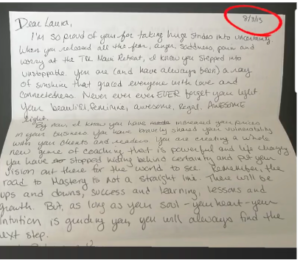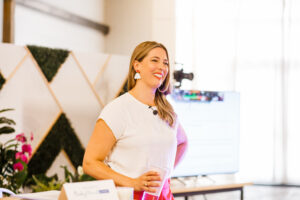When I was five years old, my parents took me and my sisters for a night out at the Sea Horse Restaurant
while on vacation at the beach. Memory tells me this particular visit was either on or right around my fifth birthday and that we were there with family friends who introduced us to this beach town. As kids of the 70s, it wasn’t uncommon for us to join our parents at “fancy” restaurants and lounges where we’d order off the adult menu, drink Shirley Temples, listen to lounge acts, be dragged on the dance floor, and stay out late enough that eventually I’d fall asleep on the table while they continued celebrating life.

On this particular evening, my dad asked me if I’d dance with him. I was a painfully shy kid, and dancing in the middle of a busy restaurant when it was past my bedtime involved a whole lot more attention directed at me than I felt comfortable with. In fact, dancing anywhere that wasn’t my bedroom when I was alone felt pretty damn scary.
So I told him no. I didn’t want to.
He asked again and told me how much fun it would be and that it would be just a few minutes.
I told him no. Again.
He acquiesced.
I set my boundary. At five years old, I recognized what felt good to me, and I set my boundary.
The evening wore on and, you guessed it… I fell asleep at the table.
I awoke to being in my dad’s arms out on the dance floor. He had picked me up while I was asleep and was dancing me all across the floor. A showman at heart, he was soaking in the “oohs” and “ahhs” and “that’s so cute” comments from all the other adults watching him — the dad dancing with his sweet, sleeping little girl.
It took me a moment to process what was going on. My groggy five-year-old brain was trying to understand what was happening. And then, I realized I was in his arms, out on that dance floor, and he was wearing the biggest smile.
I was not wearing a smile. I did not think this was adorable.
I. Was. Pissed.
I started hitting and kicking at him and wanted to be put down. I did not want to be out dancing. I did not want to be at the center of attention. I did not want to be awake or at a restaurant lounge well past my bedtime.
My dad had completely ignored my clear boundary and my “no.” He disrespected my clear withholding of consent.
In that moment, his message to me was that what he wanted around me and my body was more important than what I wanted for me and my body. This is one of the first life instances I recall where my boundaries and consent weren’t honored or respected. My needs and wants for body autonomy came after his wants and needs for whatever he got from taking me onto that dance floor after I clearly stated “no” multiple times. What I wanted wasn’t as important as what he wanted. His needs came first. It was a lesson that stuck and impacted me for years, particularly in physical and emotional relationships.
The key to boundaries is consent. And the key to informed consent is boundaries.
Boundaries are meaningless without the consent to build them, respect them, and hold strong to them.
Self-consent is a critical ingredient in allowing ourselves to recognize and honor our own boundaries. We have to give ourselves permission to explore, get clear on, and honor what we want and need.
At their heart, that is what boundaries are — recognizing what we want and need for ourselves and setting guidelines and limits to honor those things.
And, being able to set and enforce boundaries is imperative to building and offering true consent to others. They are inherently connected, each depending on the other.
What I feel like we often forget is that navigating the interplay of boundaries and consent starts the moment we are born. We enter this world with an innate understanding of our wants, needs, and boundaries. We begin figuring out our place in the world and responding to our body’s feedback and messages. Learning to listen to our own needs and asking for what is needed. In fact, these boundaries are designed for safety and survival to keep us alive! Here are just a few:
“I feel something in my body. I’m hungry. I need to eat. Now I will cry so I am fed.”
“What’s the feeling? I feel pressure. I need to go to the bathroom.”
“I’m alone. I don’t like it. I feel scared/lonely/confused. I want to be held.”
“My eyes feel heavy. I will close my eyes. I will sleep.”
“I feel recharged. And I feel that thing again. I am hungry. I need to eat. Time to cry again!”

In general, babies are born with this innate understanding of the language of their body. They are born knowing what their wants, needs, and boundaries are and they will tell us with cooing and smiling when they’re met and crying and screaming when they aren’t. Unfortunately, a baby’s “aren’t met” schedule rarely matches our schedule and as adults we begin the process of teaching them to listen to us instead of their bodies. We use things like strict feeding schedules and sleep training to teach them what we want them to need, when we want them to need it.
And as they grow, this training often continues in children’s relationships with others’ desires for them…
“Go on. Give grandma a hug. She loves you and it’s rude not to.”
“Put on a sweater. I don’t care if you’re not cold. I am cold, so you need a sweater.”
“Why do you have to do it? Because I said so.”
“Give your uncle a kiss. Go on now. Don’t hurt his feelings.”
“Clean your plate. Don’t tell me you’re not hungry — you have to eat.”
“You have to give me a hug and say, “I love you,” before you go because I’m your parent.”
“You don’t really have a headache. Your tummy doesn’t hurt. I think you’re faking.”
“You just went to the bathroom. You can’t possibly need to go again. You can hold it.”
“Of course you should sit on Santa’s lap! You’ll be okay! Go on… I want this photo.”
What’s the underlying message in each of these well intentioned (and often learned from our own upbringing) interactions with kids? “Don’t listen to your body, your intuition, your own wants and needs, kid. Adults, and especially your parents, know what you want better than you do.”
Let’s take a closer look for clarity.
“Give grandma a hug” or “give your uncle a kiss” have the underlying message that pleasing others is more important than listening to your own needs. You should act from a place of obligation and duty to others even when it feels uncomfortable, not from a place of desire and service to self. These especially can be a slippery slope around owning your body, consent, and sexual relations later in life.
“Put on a sweater” and “clean your plate” imply “I know your body better than you do” with a strong message of don’t trust your body and its signals — look outside yourself to find out what you and your body need.
“Do it because I said so” presents the message of “I’m the parent. I’m the boss. What I say goes. Don’t question my authority.” This can make it difficult to refuse something from anyone who is an authority figure, even those with mal-intent, through childhood and into adulthood. This can show in anything from not saying no to an unreasonable request at work to non-consensual sexual situations.
In addition to dictating what their body is saying and what they are feeling, shielding and protecting kids from anything hard, bad, or uncomfortable robs them of the opportunity to listen to their own body and reactions and reduces their natural instinct to set and maintain boundaries. Building boundaries and learning how to give consent comes from navigating the rocky waters of life. Telling and teaching kids to ignore their own body’s messages and consent, and then expecting them to suddenly flip these skills and understandings on as adults, simply doesn’t work. It creates space for confusion around their own boundaries and opportunity for them to be taken advantage of and harmed by scammers, friends, bosses, roommates, and romantic partners.
Phew. Does that feel kind of foreign? Maybe a bit overwhelming?
I don’t know about you, but many of us were raised with these parenting approaches and didn’t realize other options exist or don’t know where to start in doing things differently. I mean… this
is just normal and what being a parent is, right? Telling our kids what to do so they learn how to be in the world and can grow up and be successful? Isn’t that the job?
When I pause, look back, and reflect, it’s clear that I instinctively knew what my boundaries were when I was little. I had an innate understanding of what felt good and what didn’t. And like many kids, they were essentially taught out of me with actions and messaging from my parents, my siblings, my friends, and society in general. Regardless of our intent, a common message that surrounds childhood is “you’re only a kid. You don’t really understand the world and what you need. Listen to the adults. We know you better than you know yourself.”
So how do we change this? How do we invite children to listen to and understand the language of their body?
In what ways can we teach and model what consent and boundaries look like for the kids in our lives? To tell them “You have a choice about things and how you respond is also your choice?” To support them in growing into adults that can confidently say “yes” or “no” based on their own wants and needs, not those assumed or impressed upon them?
There are simple ways we can open our own awareness in everyday interactions to support kids of all ages in listening to their bodies so that they can set and honor their own boundaries and learn how to respect the boundaries and consent of those around them (including you!). Here are some examples to begin:
“Would you like a kiss before going to bed?”
“Would you like to be tickled?” or “Would you like to wrestle?”
“May I sit next to you on the couch while we read this book together?”
“I heard you say ‘stop’ while I was tickling you so I’m stopping. If you’d like more tickles, you can let me know. I won’t do it without permission.”
“May I join you in bed for tuck-ins, songs, and snuggles?” (I still ask my 14-year-old this question anytime she asks me to tuck her in. And yes, she still does!)
“Is it okay if I share with your teachers that your grandfather died?”
“You seem a little off. Would you like to share anything? It’s okay if you don’t and you can always change your mind later.”
“What a beautiful dog you have!
Is it friendly? May we say hello and pet it?”
“It’s okay if you’re not in the mood for a hug. I’m here if and when you feel ready. Just let me know.”

“Look at your friend’s face. It doesn’t look to me like they like that. What do you notice?”
“It’s okay if the waterslide feels scary. You don’t have to go on it. It’s your choice.”
“Ask grandma if she wants to snuggle or wants a hug.”
“You said your belly itches. Is it okay if I look at it? You’ll need to lift your shirt so I can see if it feels okay.”
“Is it okay if I post this photo of us on my social media?”
Boundaries and consent are this amazing interplay of how we want to be talked to and treated by others, how we talk to and treat others, how we spend our time, what we want shared about our life, and how we listen to our own body’s needs. When we ask children, or anyone, for their permission, for their consent, we let them know that we trust them and their instincts and that they can trust themselves, too. Asking for and giving consent encourages and honors boundaries.
Of course, boundaries can be fluid and are not set in stone, just as consent can be given then later revoked. When we don’t allow space for discovering and exploring boundaries or practicing giving and receiving consent from an early age, then navigating boundaries and consent as we grow and evolve through, life can feel scary, unfamiliar, and challenging. We simply don’t have the tools because we have never been given a chance to develop or practice them. Like any language, the more often you practice it, the more fluent you become. This includes the language of our body and the spoken words to claim our boundaries, give and revoke consent, and experience them being honored.
Fear not. Allowing and inviting kids to set and claim boundaries from early childhood is not about giving them carte blanche to do whatever they want and enter dangerous situations. It is not about neglecting them, letting them “run the show,” or shirking parenting/ caregiver responsibilities. It is definitely not about being at the mercy of your kids and always putting their wants and needs first and before your own.
There is always a line… a balance… and navigating that boundary can feel just as tricky as navigating any other. There is no one right way or one answer that works for every child. In fact, even within a family each child may have different approaches that work for them. Sometimes it’s messy and hard and just plain sucks. Which, frankly, I find true of all boundaries.
As we part today, I invite you to take a moment. Close your eyes, if that feels good. Imagine how having the permission and invitation to listen to your body while recognizing and honoring your own boundaries as a child might have changed how you navigate your life today.
What do you notice? What shows up for you? What might shift or stay the same moving forward? Remember, you were born with an innate understanding of your own boundaries and not only do you get to tap into that energy, you also get to guide and honor children in your life to do the same.
the key to boundaries is consent.
Lorine Hoffer, LMT
Certified BodyMind Coach, BodyMind Coaching Certification Program–Associate Coach, Big Change Facilitator
A childhood fascination with the body/mind connection led Lorine to a life- long professional focus on helping clients ditch the stress patterns (and aches and pains!) keeping them stuck. Her skills flow from massage to education to psychology and entrepreneurship. This mighty arsenal uniquely qualifies her to help clients reconnect to themselves, partners and kids so they wake up feeling rested, confident, empowered and ready to own the day.
Lorine loves to laugh, curse, explore nature, hang out with her insightful daughter, “get to the good stuff” in connected conversations and notice beauty in every day. Described as having both fierce compassion and fierce independence, she’ll hold space for you and hold you accountable to the big changes you’re ready to claim.
LorineHoffer.com
Lorine@LorineLoffer.com
IG: @LorineHoffer
FB: LorineHoffer / Lori Hoffer
FB: Life Connected




